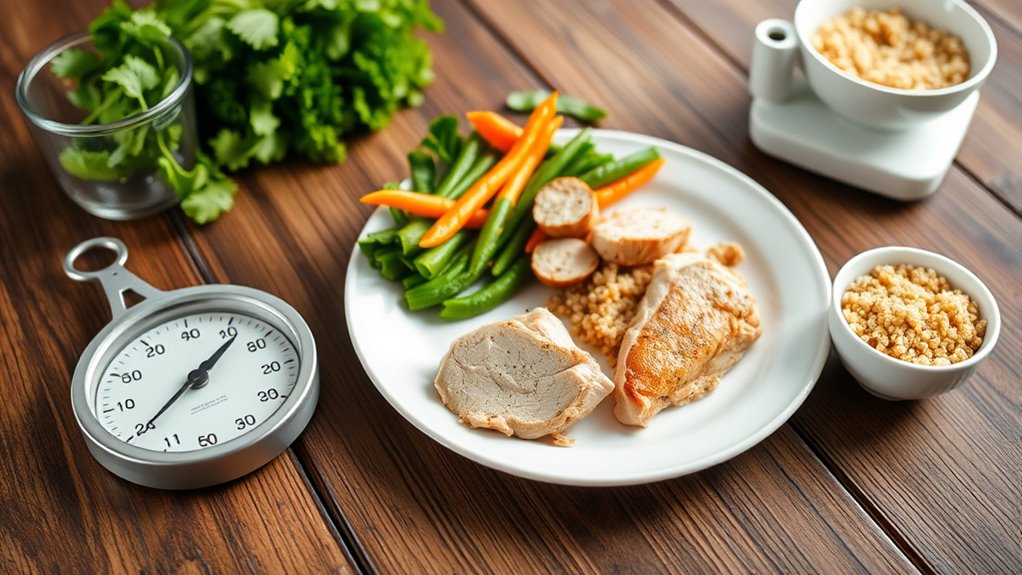To meet your nutritional needs, focus on managing portion sizes using visual cues and measuring tools to avoid overeating, which helps protect your joints and organs. Prioritize getting enough high-quality protein from sources like lean meats, dairy, beans, and plant-based options to support muscle health and immunity. Incorporating nutrient-dense foods, healthy fats, and balanced meals boosts energy and overall wellness. Keep small, consistent changes for lasting benefits—if you keep exploring, you’ll discover more ways to enhance your diet.
Key Takeaways
- Proper portion sizes support senior health by preventing overeating and ensuring adequate nutrient intake.
- Using visual cues and measuring tools helps seniors accurately estimate serving sizes.
- Including high-quality protein sources like lean meats, dairy, and plant-based options maintains muscle mass and immunity.
- Distributing protein intake evenly throughout the day enhances muscle repair and overall strength.
- Incorporating nutrient-dense foods and healthy fats improves energy, nutrient absorption, and overall well-being.
Understanding Proper Portion Sizes for Seniors

Because your nutritional needs change as you age, understanding proper portion sizes is essential for maintaining good health. Calorie counting becomes more important, helping you avoid overeating while still getting essential nutrients. When you plan your meals, focus on appropriate portions to balance energy intake and nutrient density. Using visual cues, like a deck of cards for meat or a baseball for grains, can help you gauge serving sizes without constantly measuring. Proper portion control also supports weight management, reducing strain on your organs and joints. Incorporating these strategies into your meal planning makes it easier to stick to your dietary goals. Remember, mindful eating and accurate portion sizes are key to maintaining overall health and well-being as you age.
How to Measure and Control Your Food Intake

To keep your portions in check, start by understanding recommended size guidelines for different foods. Using measuring tools like cups, spoons, or a food scale makes it easier to guarantee how much you eat. This helps ensure you’re nourishing your body without overeating. Being aware of your water intake can also support overall health and digestion.
Portion Size Guidelines
Understanding portion sizes is essential for maintaining a healthy diet as a senior. Practicing mindful eating helps you become more aware of your hunger cues and prevents overeating. Use visual cues to gauge proper portions, like a deck of cards for meat or a tennis ball for fruit. Controlling your portions doesn’t mean sacrificing nutrition; it means being intentional about how much you eat. Using smaller plates and bowls can naturally limit your intake, making portion control easier. Focus on quality over quantity, emphasizing nutrient-dense foods that support your health. Incorporating appropriate serving sizes can help you better manage your weight, energy levels, and overall well-being. Remember, mindful eating is key to making healthy choices that fit your lifestyle.
Using Measuring Tools
Have you ever wondered how to accurately measure your food to guarantee proper portion sizes? Using measuring tools like cups, spoons, and a kitchen scale helps you stay consistent with your meal planning. When you measure ingredients precisely, you control your intake of calories, protein, and other nutrients essential for seniors. Proper measurement also makes food storage easier because you can portion leftovers into containers, reducing waste and keeping food fresh. Keep a set of measuring tools nearby during meal prep to ensure accuracy. This simple step helps you stick to your nutritional goals and prevents overeating. Additionally, understanding portion control ensures you consume appropriate amounts of food, supporting overall health. By integrating these tools into your routine, you gain better control over your diet and make healthier choices every day.
The Importance of Protein in Senior Nutrition

Protein is crucial for maintaining your muscle mass as you age, helping you stay strong and active. It also plays a key role in supporting your immune system, so you can better fight off illnesses. Including enough protein in your diet is a simple way to boost your overall health and vigor. Recognizing the importance of spiritual guidance can also help you approach your health journey with a positive mindset.
Preserving Muscle Mass
As you age, maintaining muscle mass becomes increasingly important for strength, balance, and overall health. To do this, pay attention to meal timing—spreading your protein intake evenly throughout the day helps your muscles repair and grow. Incorporate protein-rich foods into each meal, like lean meats, dairy, or plant-based options. Hydration strategies are equally essential; staying well-hydrated supports muscle function and prevents fatigue. Drinking water regularly ensures your muscles stay supple and recover efficiently after activity. Avoid waiting too long between meals, which can lead to muscle loss. Instead, aim for consistent, balanced nutrition with adequate protein and hydration. This approach keeps your muscles strong and helps you maintain independence as you age. Being aware of the harmful impacts of certain practices, such as air pollution, can further motivate maintaining healthy habits for overall well-being.
Supporting Immune Function
Supporting immune function is essential for seniors, especially since aging can weaken the body’s ability to fight off infections. Protein plays a crucial role by helping produce antibodies and immune cells needed for defense. Make sure your diet includes enough high-quality protein sources like lean meats, dairy, or plant-based options. Vitamin C also boosts immunity by supporting white blood cell production and improving your skin’s barrier against pathogens. Stay well-hydrated, as proper hydration helps your immune system function efficiently and keeps mucus membranes moist, making it harder for germs to enter your body. Incorporating immune-boosting nutrients such as zinc and selenium can further enhance your immune defenses. By combining adequate protein intake, vitamin C-rich foods, and staying hydrated, you strengthen your immune defenses and better protect yourself against illnesses.
Best Sources of Protein for Older Adults

Getting enough protein is essential for maintaining muscle mass, supporting immune function, and preventing age-related health issues. Older adults can find quality protein in a variety of sources, including meat alternatives and plant-based proteins. Meat alternatives like tofu, tempeh, and seitan are excellent options that provide essential amino acids while offering variety in your diet. Plant-based proteins such as beans, lentils, chickpeas, and quinoa also deliver vital nutrients and fiber, supporting digestion and overall health. Incorporating these protein sources into your meals helps guarantee you’re meeting your nutritional needs without relying solely on animal products. Using plant-based options can help diversify your nutrient intake and may contribute to improved health outcomes. By choosing a mix of meat alternatives and plant-based proteins, you can enjoy a balanced, nutrient-rich diet that promotes strength and vitality as you age.
Balancing Macronutrients for Optimal Health

Balancing macronutrients—carbohydrates, proteins, and fats—is key to maintaining energy, supporting bodily functions, and preventing chronic health issues. To do this effectively, consider meal timing; spreading out your intake helps stabilize blood sugar and sustain energy levels throughout the day. Incorporate a variety of nutrient-rich foods in each meal to guarantee you’re getting enough carbs for energy, lean proteins for repair, and healthy fats for brain health. Hydration strategies also play a crucial role, as staying well-hydrated aids digestion and nutrient absorption, keeping you energized. Properly balancing your macronutrients and maintaining good hydration helps you feel your best and reduces the risk of age-related ailments. Additionally, paying attention to high refresh rates in your daily routines can improve overall alertness and well-being.
Tips for Incorporating Nutrient-Dense Foods Into Daily Meals

Incorporating nutrient-dense foods into your daily meals can markedly boost your overall health and energy levels. Start with healthy snacking by choosing options like nuts, seeds, or fresh fruit to fill nutritional gaps between meals. When planning your day, use meal prep tips to streamline healthy eating—prepare and portion vegetables, lean proteins, and whole grains in advance. This makes it easier to add nutrient-rich ingredients to every meal without extra effort. Incorporate colorful vegetables and fruits into your plates to maximize vitamins and antioxidants. Don’t forget to include sources of healthy fats, like avocados or olive oil, to enhance nutrient absorption. Additionally, choosing aquatic exercise can improve your overall physical health while being gentle on joints. Small, consistent changes make it simple to boost your intake of essential nutrients and support your overall well-being.
Frequently Asked Questions
How Can Seniors Ensure They’Re Getting Enough Hydration Alongside Proper Nutrition?
To make certain you’re getting enough hydration alongside proper nutrition, focus on hydration strategies like drinking water regularly throughout the day and incorporating hydrating foods such as fruits and vegetables. Monitor your fluid intake by setting reminders and carrying a water bottle. Limit caffeine and alcohol, which can dehydrate you. Staying consistent with these habits helps maintain your hydration levels, supporting overall health and proper nutrient absorption.
Are There Specific Dietary Restrictions for Seniors With Chronic Health Conditions?
You might think dietary restrictions limit your enjoyment, but for seniors with chronic health conditions, they’re crucial. You need to follow specific dietary restrictions to manage conditions like diabetes, heart disease, or kidney issues. These restrictions help control symptoms and prevent complications. Always consult your healthcare provider or a dietitian to tailor your diet safely, ensuring you get essential nutrients while adhering to your chronic health management plan.
How Does Aging Affect Nutrient Absorption and Metabolism?
Aging leads to age-related digestive and metabolic changes that slow down how your body absorbs and processes nutrients. Your stomach produces less acid, making it harder to absorb minerals like calcium and iron. Additionally, your metabolism becomes less efficient, affecting how you break down foods and utilize nutrients. These changes mean you might need to adjust your diet, focusing on nutrient-dense foods to maintain ideal health and prevent deficiencies.
What Are Affordable Ways to Include More Protein in Senior Diets?
Boost your budget with basic, budget-friendly options like beans, lentils, and canned tuna to pack in protein. Incorporate plant-based options such as chickpeas, tofu, and oats into your meals for variety and vigor. Buying in bulk, choosing store brands, and planning meals can make these affordable sources more accessible. These simple, cost-conscious choices help seniors strengthen strength and sustain energy every day.
How Can Seniors Adapt Meal Portions When Experiencing Decreased Appetite?
When experiencing decreased appetite, you can adapt your meal portions by making simple meal plan modifications, such as smaller, more frequent meals that are nutrient-dense. Incorporate appetite stimulants like flavorful herbs or warm beverages to boost your desire to eat. Focus on easily digestible, appealing foods, and listen to your body’s hunger cues. This helps guarantee you get essential nutrients without feeling overwhelmed by large portions.
Conclusion
Staying on top of your nutrition might seem simple, but there’s always more to discover that can transform your health. As you learn to balance portions and embrace the best protein sources, you’ll uncover new levels of vitality. The next step? What secret nutrient-dense foods could make all the difference? Keep exploring—your best health could be just a bite away, waiting to surprise you when you least expect it.









